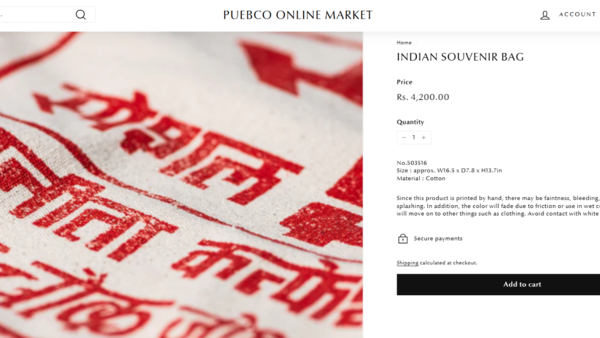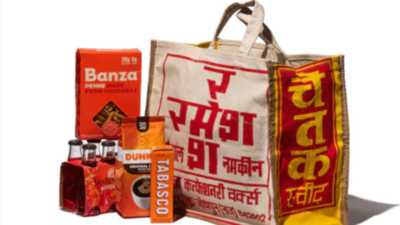Indian Jhola: Luxury or loot? American store sells Rs 100 Indian jholas for a whopping Rs 4200! |

The humble Indian Jhola, no frills, no fancy leather, is a simple, all-purpose cotton bag long associated with Indian households, college students, and activists, of course. Now, suddenly, this Indian jhola has found itself in the global fashion spotlight and not without any controversy.What typically costs in India around 100 rupees or even at times is free with purchases at Indian local markets, is now being sold for jaw-dropping prices by an American luxury retailer,Nordstrom, for approximately $48 (4,228 Indian Rupees).The bag in question is being marketed as an “Indian Souvenir Bag” by Japanese lifestyle brand Puebco. Made of cotton and emblazoned with Hindi script that resembles the kind of packaging found on lentils and masalas, the jhola is nearly identical to those casual bags slung across India, except for one striking difference: the price!Social media erupted in disbelief as images of the listing went viral. Many indians could not help but laugh over the fact that the bags they used to carry vegetables and groceries are now being sold as popular bags among high fashion enthusiasts. This is a case of classic western repackaging and rebranding.Memes across social media are comparing that jhola to global luxury bags that surfaced instantly. Others expressed outrage at how an everyday cultural object, often associated with frugality and function, had been transformed into a high-priced “exotic” item for western consumers.
How are people reacting all over social media?

Image credit: Puebco/Indian souvenir bag
The internet, as usual, was quick to erupt; many users expressed a mix of amusement and outrage at what they saw as a blatant case of cultural appropriation and commercial exploitation.“It is not about the bag; it is about the blatant repacking of our culture without context or credit,” one user posted.Another reply, sarcastically quipped, “Should we start exporting tiffin boxes next as artisanal lunchware?” A user on X commented, “For $48, I’ll throw in an extra jhola, a steel dabba, and a packet of Maggi.”A Delhi-based artist wrote, “This isn’t just tone-deaf, it’s bizarre. You can buy these for ₹60 outside Daryaganj Metro Station.”
What else will Americanization steal from us?
The controversy surrounding American. Rebranding Indian staples into high-fashion items is not new. Major fashion houses have faced similar criticism for selling items like lungi-styled skirts, kurta-like tunics, and even rubber slippers that were sold at exorbitant rates, marketed as exotic or avant-garde fashion in the West.While some argue that global recognition of Indian design should be celebrated, others insist that it must come with context, respect, and fair acknowledgment of cultural origins. In the case of the Indian Jhola, what was once a symbol of sustainability and street-smart sensibility has now become a case study in how globalization and luxury branding can sometimes distort cultural narratives for profit.As one viral tweet can sum it up, “Call it what you want; to us, it will always be the bag you forget in the back of your dad’s scooter.”
















